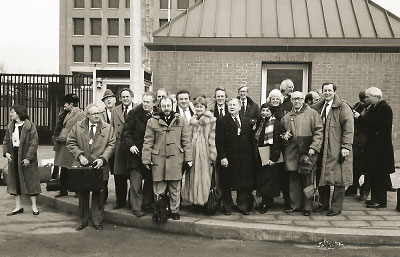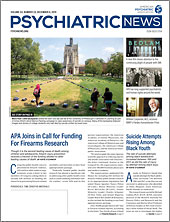“Whether it is recognized or not, all psychiatrists are internationalists,” wrote past APA Medical Director Melvin Sabshin, M.D., “and the field of psychiatry is international.”
Sabshin, writing in his 2008 memoir Changing American Psychiatry: A Personal Perspective, believed that APA’s having an international voice was important and valuable in its own right. But he also believed that the forging of strong bonds overseas and the achievement of APA’s own goals here at home—especially equitable treatment for people with mental illness—were intimately related.
American psychiatry after World War II had internationalism in its DNA: the profession had been profoundly influenced, with enduring results, by the influx of European psychoanalysts after the war. But it was in the early 1970s that APA began to formally exercise its sea legs and step out on the world stage. The Council on International Affairs was founded to help establish relationships with professional psychiatric organizations in Europe, South America, and Asia and to develop overseas study trips for APA members.
In 1972, Howard Rome, M.D., a past president of APA, was elected president of the World Psychiatric Association (WPA). (Sabshin was elected to the WPA’s Executive Committee in 1983. WPA has had two other APA members serve as presidents in recent years—Juan Mezzich, M.D., in 2005 and past APA President Pedro Ruiz, M.D., in 2011.)
The year 1977 was a seminal one for APA’s growing international influence. The WPA meeting that year was held in Honolulu, and a major item on the agenda was discussion of reports that the Soviet Union was systematically using psychiatric hospitalization to silence and detain political dissidents. It was a watershed event in what would lead to a dramatic confrontation with the Soviets.
Pytor Grigorenko was a high-ranking Soviet military general who was a hero of World War II and a vocal critic of human rights abuses in the Soviet Union. In 1964 he was committed to a psychiatric hospital by Soviet psychiatrists. News of the general’s confinement came to the attention of Ukrainian psychiatrist Semyon Gluzman, M.D., a connection that would prove critical. Gluzman had contacts with dissident circles and after reading Grigorenko’s file concluded that his incarceration had been for political reasons. Gluzman’s report found its way to the KGB, and he too was arrested and sentenced to 10 years in camp and exile.
APA recognized Gluzman’s courage in 1977 by making him a distinguished fellow of APA. Also, the WPA meeting that year in Honolulu resulted in a statement describing the rights of psychiatric patients and denouncing political abuses of the profession.
In 1982, Sabshin established APA’s Office of International Affairs. The office would prove critical in extending APA’s reach all over the globe and was especially useful in the confrontation with the Soviet Union, forwarding letters to Soviet authorities inquiring about political dissidents who were believed to be detained in psychiatric hospitals. In 1983 the Soviets withdrew from the WPA under threat of expulsion, and in 1989 the confrontation culminated in a remarkable visit to Soviet hospitals by American psychiatrists led by the U.S. State Department and the National Institute of Mental Health.
The confrontation with the Soviets raised the international profile of American psychiatry and APA and served as one of many subplots in the eventual unraveling and dissolution of the Soviet Union.
Through the Office of International Affairs, APA also spoke up for human rights in Chile, China, Cuba, and South Africa. In 1985, APA participated in a mission to Chile under the Pinochet regime, funded by the MacArthur Foundation. The Medical Society of Chile had taken very courageous positions against torture and had invited this delegation, which included Lawrence Hartmann, M.D., a future APA president. Sabshin recalled that the delegation’s report was “riveting” and resulted in testimony before a congressional committee.
Hartmann, one of APA’s longtime leaders in international relations, recalled in an interview that many more of APA’s international activities have been of the quieter sort. “A lot of APA’s efforts overseas have been less glamorous but nonetheless vital: setting up routine connections among individuals, psychiatric organizations, and scientific agencies overseas—the quiet, incremental building of an international infrastructure.”
During Hartmann’s presidency, APA established its Human Rights Award, now the Chester M. Pierce Human Rights Award. (Gluzman received the Human Rights Award in 2001). After the fall of the Soviet Union, Hartmann said, APA received requests for help from psychiatrists in the former Eastern-block countries—after years under Soviet rule, they knew little or nothing about social psychiatry, psychoanalysis, or the latest developments in biological psychiatry. Hartmann and others helped to organize a “Travelling University” that brought major American teachers to lead educational seminars for psychiatrists in Czechoslovakia, Hungary, and Poland. “It was the kind of thing made possible by APA’s work of building international relationships over many years,” Hartmann said.
The Office of International Affairs was terminated in 1999, but APA continues to be active through its Council on International Psychiatry and participation in the WPA and international psychiatric society meetings by APA CEO and Medical Director Saul Levin, M.D., M.P.A., and other APA leaders.
Today the council’s activities include, among others, the participation of council members in presentations at the APA and international psychiatric meetings; fostering professional development for international poster presenters at the Annual Meeting through the International Poster Engagement Program (IPEP); focusing on issues impacting the mental health of immigrants, asylees, and refugees through policy development and global mental health education; and supporting bilateral learning and exchange on global mental health and international topics through the Caucus on Global Mental Health and Psychiatry, which has grown to encompass more than 800 members.
“An American psychiatry that is respected and admired across the world …,” wrote Sabshin, “will be more likely to achieve equity than will an organization that functions as a self-absorbed, isolated trade union.” ■
More information on APA’s Council on International Psychiatry is posted
here. More information on the Caucus on Global Mental Health and Psychiatry is available by contacting Ricardo Juarez at
[email protected].


